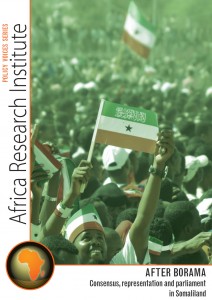On the eve of local elections in November 2012, Africa Research Institute interviewed ten prominent Somalilanders, including the three Speakers of the House of Representatives, two government ministers, MPs, civil society activists and representatives of women's organisations. The conversations presented in After Borama: Consensus, representation and parliament in Somaliland focus on the way in which political stability has been maintained since the landmark Borama conference in 1993 – and on approaches that need to be adapted in the future. Collectively, they are a timely assessment of democratic politics, the role of institutions and national development priorities in Somaliland.
The Conference of Elders of the Communities of Somaliland in Borama established the institutional foundations of an independent state. More than 2,000 people attended the gathering. The 150-member Guurti – a council of elders drawn from all clans – constituted the voting delegates. In the course of four months, consensus was reached about disarmament and demobilisation following the overthrow of President Mohamed Siyad Barre's government, inclusive political representation and the creation of institutions – the bedrock of two decades of relative peace and stability.
The personal accounts set out in these pages offer important insights into the experiences of Somalilanders in negotiating peace and building inclusive democratic institutions. In Section 1, the Speakers of the Somaliland Parliament recall the evolution of democratic politics, citing a longstanding history of participatory dispute resolution between clans, the conduct of the Somali National Movement, and adoption of a new constitution by referendum in 2001. Section 2 explores the important function elections fulfil in establishing equitable representation for Somalilanders – and maintaining stability. The emotive debate about the role of women in formal politics is also discussed.
Section 3 focuses on the functioning of parliament. Particular attention is given to the House of Elders –its relationship with the executive and the House of Representatives, and its participation in lawmaking. In Section 4, Somaliland's Minister for National Planning and Development reflects on his experiences of dealing with international donor organisations, and sets out clear priorities for job creation, revenue generation and infrastructure development. A thoughtful and constructive postscript is contributed by the co-ordinator of the international election observation missions in 2005, 2011 and 2012.
The political and economic achievements outlined in After Borama, the latest publication in Africa Research Institute's Policy Voices series, should be widely acknowledged and lauded – but not romanticised. For two decades, Somaliland has ploughed its own furrow – through success and setback.

No comments:
Post a Comment